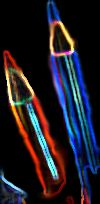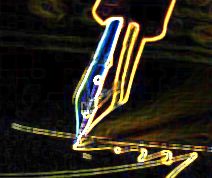Monday, February 05, 2007
Diploma in Experience Design (Interaction & Product) (DXIP)
Overview Entry Requirements What You'll Study Your Future
First Year
Module Code Module Name Total Hours
SD401Z Design Studio 1 240
SD402Z Visualisation & Communication 120
SD403Z Experience Design Principles & Strategies 90
SD404Z Basic Materials & Production Methods 90
SD204Z Human Centred Design 60
SD303Z History and Theory of Ideas 1 60
Innovation Design and Enterprise in Action
Oral Communication
Character Development
General Elective Module 1
Second Year
Module Code Module Name Total Hours
SD405Z Design Studio 2 240
SD406Z Interactive Design Technology 1 120
SD407Z Interaction Design Principles & Strategies 1 90
SD408Z Advanced Materials & Production Methods 90
SD409Z Experience Design Tools 1 (Ethnography & User Research) 60
SD4201 Experience Economics 60
General Elective Module 2
Course Specific Elective* 60
General Elective Module 3
Third Year
Module Code Module Name Total Hours
SD410Z Design Studio 3 360
SD411Z Interactive Design Technology 2 120
SD412Z Interaction Design Principles & Strategies 2 90
SD413Z Experience Design Tools 2 (Prototyping & Staging Experiences) 90
ST6303 Entrepreneurship in Creative Industries 45
General Elective Module 4
Synopses of Modules
SD401Z Design Studio 1
Experience Design is the creation of Original, Unique, Memorable and Transformative Experiences though the holistic application of the platforms of Objects, Spaces, Media and People. The Design Studio 1 aims to develop an understanding of the design process, and to develop sensitivity to its relationship with people, socio-cultural factors, materials, business, and technology. The first year studio projects will be at an introductory level, and will allow students to be conversant with designing on a range of scales for the human body, objects, spatial environments, and services. The projects will progressively apply the skills and knowledge acquired through modules on visualisation & communication, experience design principles & strategies, basic materials & production methods, human centred design, and history and theory of ideas.
Back to top
SD402Z Visualisation & Communication
The ability to visualise information/products/services and the interaction/experience that consumers have with them; and represent them for the purpose of communication, is an essential skill any experience designer should possess. The students will be trained in the following:
Freehand drawing and sketching methods.
2-dimensional technical drawing for product, mechanical and spatial design applications.
Computer-Aided Design & Drawing skills in both 2-dimensional and 3-dimensional forms and representation.
Computer-Aided visualisation and presentation skills in a variety of multimedia mediums and formats (e.g. image, animation, video & audio).
Back to top
SD403Z Experience Design Principles & Strategies
This modules aims to introduce experience design is a meta-concept or philosophy that provides direction, vocabulary, and technique that can enable multiple disciplines to work together in a unified manner. Students will begin by learning to differentiate between designing objects and designing experiences. They will learn the principles that define or drive the orchestration of the organizations products, behaviours, communications, and environments across multiple tasks/activities/contexts. They will apply the strategies to design individual products or services that are informed by the above principles.
Back to top
SD404Z 2D Basic Materials and Production Methods
Students will be trained to have a broad understanding of materials and manufacturing processes and so as to be able to apply such knowledge in the design of products and environments. Students will be taught to identify and analyze properties, processing methods, and finishing of organic and natural materials such as wood, ceramics, natural rubbers, glass, and metals.
Back to top
SD204Z Human Centred Design
This module explores the evolution of design and its historical impact on social patterns, cultural values and economics, leading to a critical understanding of the importance of human factors in design endeavours. Students will examine and critique key milestones, personalities and works in the field, while learning to apply cognitive, social, cultural and physical human factors in design. Topics on ergonomic and cognitive efficiency in the design of information, products and environments will help students understand key issues on the use and reception of design, and their dynamic interactions on group and user behaviour shaped by prevailing cultural values.
Back to top
SD303Z History and Theory of Ideas 1
This module will develop a basic understanding of contemporary critical thought and its fundamental philosophical, social, and cultural issues surrounding design and how these issues influences the development of design thought. The second semester will focus on more specific artists, designers, architects, movements and historical trajectories in a manner that informs and complements their design intentions. The module will draw upon the historical lineage and identifies the predominant civilizations throughout history and the contribution they have made to art, architecture and design.
Back to top
SD405Z Design Studio 2
The second year design studio will begin to focus on product & interaction design with the aim to enable students to create compelling and meaningful integrated interaction systems based on products, services and experiences. The studio projects will explore and engage with areas of design within the contexts of living and working environments. The projects will be at an intermediate level, and will allow for a greater integration of components of interaction systems. The projects will progressively apply the skills and knowledge acquired through modules on interactive design technologies, interactive design principles & strategies, advanced materials & production methods, and experience design tools.
Back to top
SD406Z Interactive Design Technology 1
Students will be introduced to the underlying technologies required to develop, prototype and produce compelling interaction designs. A primary technology is software programming to form and control the necessary connections to the components (either hardware or software) of a system. Students will be taught both script based (e.g. lingo) and structured programming (e.g. Visual Basic) languages and methods.
Programming skills learned will support and be applied in the design studio projects. Students will be able to do the following upon completion of the course:
Understand and apply basic programming for both structured and scripted languages.
Successfully program and prototype interfaces for both graphical and physical user interfaces.
Students will also be exposed to the Interactive and Wireless Technologies, develop a conceptual understanding of the systems and components involved, and postulate the application of these into new and innovative interactive scenarios.
Back to top
SD407Z Interaction Design Principles & Strategies 1
This module will introduce the concept of interaction design, its background, applications and technology. It will develop an understanding of design in an increasingly complex and technologically mediated consumer landscape. Students will gain knowledge of how people perceive, understand, use and experience interactive objects. They will learn and apply a methodology and process of designing interactive products, services and experiences in the design studio projects.
Back to top
SD408Z Advanced Materials and Production Methods
The advanced materials and production methods module will build upon the first year basic materials and production methods module. Students will be trained to have a more focussed and specialised understanding of materials and manufacturing processes and so as to be able to apply such knowledge in the design of products and environments. Students will be taught to identify and analyze properties, processing methods, and finishing of synthetic materials such as plastics, synthetic rubbers, elastomers, and composites.
Back to top
SD409Z Experience Design Tools 1 (Ethnography & User Research)
In this module, students will be introduced to ethnography as a major tool for understanding, analysing and defining experience design problems. They will be introduced also to a array of other user research techniques such as gathering user data through contextual inquiry, research surveys, focus groups, interviews, interpreting interviews, task analysis, creating work models (flow, sequence, culture, physical, artefact etc.), consolidating data across users, building affinity diagrams, using data in the design process etc. Focus will be on comparison of different tools for different contexts so that students become adept at applying the appropriate tool(s) for their design needs.
Back to top
SD4201 Experience Economics
In this module, students will gain an in depth understanding of the drivers and catalysts experience economy. The module will provides a seminar setting for the discussion of interaction and product design and their impact on the experience economy through a series of readings in culture and commerce. Students will analyse the trends in technology and lifestyle to speculate and propose design solutions to existing scenarios or completely new ones. The ideas thus generated will serve as seeds for design studio projects in the third year.
Back to top
SD410Z Design Studio 3
The third year design studio will strive for holistic integration of components of interaction system and design that result in total experiences. Students will learn how to extract meaning from observations and apply design methods for envisioning innovative and alternative interaction design concepts. Advanced formats for mocking up and prototyping design concepts will round-up the students' interaction design repertoire, and techniques for sharing narratives as tangible design products will open a new arena for design communication and documentation. The projects will progressively apply the skills and knowledge acquired through advanced modules on interactive design technologies, interactive design principles & strategies, and experience design tools.
Back to top
SD411Z Interactive Design Technology 2
While the students were taught software programming in the second year to form and control the necessary connections to the components (either hardware or software) of a system, the second year interactive design technology module will focus on the hardware components and the subsequent integration and interface with software. Students will be introduced to and taught the principles and workings of components and devices within areas such as sensor technology, wireless technology, and information & communications technology (ICT).
Knowledge and skills acquired will support and be applied in the Design studio projects. Students will be able to do the following upon completion of the course:
Understand and apply appropriate sensor technology in the areas of force, light, motion, temperature, pressure, touch, voltage, and other emerging technologies.
Understand and apply appropriate wireless technology in the areas of radio frequency identification (RFID), infra-red, Bluetooth, ZigBee , Wi -Fi, and other emerging technologies.
Understand and apply appropriate ICT technology in the areas of broadband communications, network communications, mobile communications, mobile devices, and other emerging technologies.
Successfully program and prototype interfaces for both graphical and physical user interfaces.
Back to top
SD412Z Interaction Design Principles & Strategies 2
This module will reinforce and extend the concepts learnt in the second year. Students will learn design methodologies for complex products, services and events such as design of integrated systems, products for future use, products to be used in groups, devices used in public places, design of multi-modal interfaces, expressive interfaces, and products that enrich user experience. Students will be introduced to a repertoire of design principles and strategies will be drawn from multi--disciplines such as product design, visual communication, information architecture, cognitive psychology and computer science.
Back to top
ST6202 Media Law & Policy
Introduces students to the laws, regulations and ethical concepts which affect the media and communication industries. The areas covered include copyright and plagiarism, privacy, intellectual property, legal features of business organisations, freedom of speech, objectionable materials, and social responsibility.
Back to top
SD413Z Experience Design Tools 2 (Prototyping & Staging Experiences)
In this module, students will be introduced to a range of advanced design techniques such as scenario building, personas, body storming, storyboarding, prototyping etc. Prototyping techniques will include rapid prototyping, video prototyping, constructing models and 2D/3D mock-ups, paper, theatre, electrical/mechanical devices integrated with power, sensor, wireless, and ICT components. After having constructed the appropriate prototype, students will learn to stage the experiences by orchestrating consumer behaviours on/with them to understand how they work. Such understanding will be applied back into the design process.
Back to top
ST6303 Entrepreneurship in Creative Industries
This module will provide students with the basic know-how of planning and starting a business. It covers the process of business idea generation, competitive analysis, business plan development and ways to launch a business. Focus will be on the roles of various governmental agencies in promoting entrepreneurship and opportunities available in Singapore .
Back to top
Last updated/checked on 5 January, 2007
Singapore Polytechnic
500 Dover Road Singapore 139651
Copyright © 2006 All Rights Reserved
Privacy Statement
Disclaimer
This site is best viewed at a minimum screen resolution of 1024 x 768, with Firefox 1.5+ or Internet Explorer 6.0+ with Javascript enabled.
strange >>>> stranger >>>> strangest >>>> STRANGGLED! at
9:24 PM



